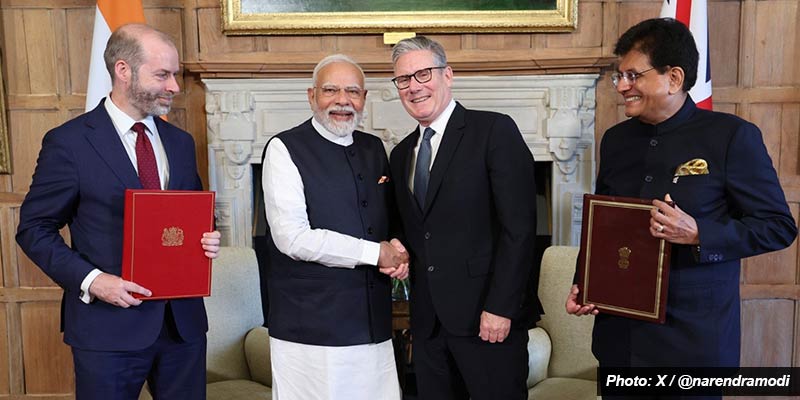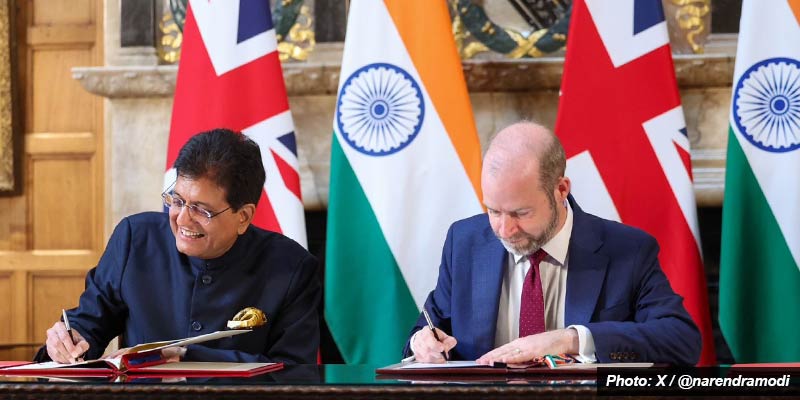- India
- Jul 25
- Sreesha V.M
India, UK sign Comprehensive Economic and Trade Agreement (CETA)
• India and the United Kingdom signed the Comprehensive Economic and Trade Agreement (CETA) on July 24.
• Prime Minister Narendra Modi and his UK counterpart Keir Starmer witnessed the signing of the agreement by Commerce Minister Piyush Goyal and his UK counterpart Jonathan Reynolds in London.
• The deal aims to double the $56 billion trade between both countries by 2030.
• PM Starmer termed it the biggest and most economically significant trade deal Britain has made since Brexit.
• The two sides have also secured an agreement on the Double Contribution Convention (DCC) that will provide for exempting employers of Indian workers from paying social security contributions in the UK for up to three years. The DCC will come into effect alongwith the CETA.
Highlights of the trade agreement:
• CETA marks a significant milestone in India’s engagement with major developed economies and reflects a shared commitment to strengthening economic integration.
• CETA secures unprecedented duty-free access for 99 per cent of India’s exports to the UK, covering nearly the entire trade basket.
• This is expected to open new opportunities for labour-intensive industries such as textiles, marine products, leather, footwear, sports goods, toys, and gems and jewellery, alongside fast-growing sectors like engineering goods, auto components, and organic chemicals.
• For India, the FTA represents its most significant strategic partnership with an advanced economy and could serve as a model for future agreements, including a potential deal with the European Union.
• Under the pact, tariffs on Scotch whisky will be reduced from 150 per cent to 75 per cent immediately, and further lowered to 40 per cent by 2035.
• On automobiles, India will reduce import duties to 10 per cent over five years, down from the current rate of up to 110 per cent, under a gradually liberalised quota system.
• In return, Indian manufacturers will gain access to the UK market for electric and hybrid vehicles, also within a quota framework
• India has provided duty concessions to the UK auto exporters only on large petrol and diesel vehicles and high-priced EVs, while protecting sensitive segments of the domestic automotive industry, especially mid and small cars and low-priced EVs, under the trade pact.
• No concessions are given to electric, hybrid, and hydrogen-powered vehicles in the first five years of the agreement.
• On the other hand, India will get duty-free access to several agri goods in the UK, such as fruits, vegetables, cereals, turmeric, pepper, cardamom, and processed goods like ready-to-eat food, mango pulp, pickles, and pulses.
• Over 95 per cent of agricultural and processed food tariff lines will attract zero duty.
• Marine products such as shrimp, tuna, fishmeal, and feeds, currently taxed between 4.2 per cent and 8.5 per cent at present, will become completely duty-free once the pact comes into force. It may take about a year, as it requires approval from the British Parliament.
• In the textiles segment, the deal would eliminate the tariff on textile imports from India, thereby enhancing its price competitiveness in the UK market.
• Products that are poised for exponential growth include RMG (ready-made garments), home textiles, carpets, and handicrafts, where the removal of duties would create competitive advantages.
• India is expected to gain at least 5 per cent additional market share in the UK within one to two years of the implementation of the deal.
• The pact also announced tariff elimination (from 18 per cent at present) for Indian engineering exports to the UK. It could help double domestic exports in the next five years to over $7.5 billion by 2029-30.
• India’s exports of generic medicines and medical devices, such as X-ray systems and surgical instruments, will get a major boost with Britain agreeing on zero duty under a free trade agreement.
• On the services front, the agreement will enable Indian financial services players to expand their footprint in Britain, enhance their competitiveness and serve the Indian diaspora and businesses.
• For digitally delivered financial services, the UK has provided market access with respect to the various sub-sectors under both insurance and insurance-related, and banking and other financial services.
(The author is a trainer for Civil Services aspirants.)


